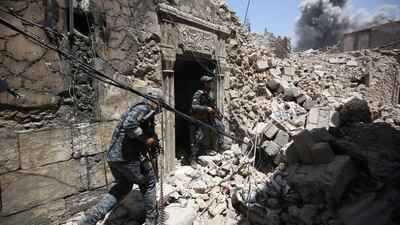‘I am the wali who presides over you ... If you see that I am right, assist me.” With these words, the leader of ISIL, Abu Bakr Al Baghdadi, declared that he had founded a new worldwide caliphate and would be known as the caliph Ibrahim.
Three years have passed to the day since Al Baghdadi ascended the steps of the Great Mosque of Al Nuri in Mosul to declare himself the global leader of Muslims. In that time, the brutality of ISIL’s rule has been shown for the world to see. But as the “caliphate” of ISIL comes to an end in Iraq, the threat from the ideas and politics that birthed ISIL remains.
Almost from the moment the “caliphate” was created, it was mocked, shunned and attacked by Muslims. Unfortunately, the thousands who flocked to fight for it from Europe, Africa and Asia were sufficient for it to expand, occupy land in both Syria and Iraq, rule over millions of people in two countries and inspire attacks across the world.
Now the group is on the run, besieged in Mosul and in its Syrian stronghold of Raqqa. Aware of the publicity value of the Al Nuri mosque, the militants blew it up rather than let the Iraqi army capture it and gloat. This latest act was only part of the brutality of the group. In the past three years, the world has watched with horror as ISIL has broadcast its mass killings, journalists have uncovered mass graves, and the suffering of those who lived under ISIL has been revealed. Even today, there are thousands still living under the yoke of the group. Those who have been brutalised, enslaved and injured will never forget what happened under this “caliphate”.
Yet this particular iteration of militancy will not be the last, not unless the conditions that gave rise to the group are tackled. Inside Iraq, the sectarianism of the Maliki government pushed some Sunnis to ISIL
in an ill-advised -- even disastrous -- attempt to seek protection".
In Syria, the brutality of the Assad regime accomplished a similar reaction.
More broadly, an extreme interpretation of Islamic teaching has given the straightforward political violence of ISIL a thin veneer of legitimacy – not enough for the majority of Muslims, but enough to convince angry and isolated young men from around the world to fight for a cause they barely understand.
The end of ISIL will draw to a close one of the worst chapters of the modern Middle East. But without careful guard, extremism could rise again in an unexpected way.

